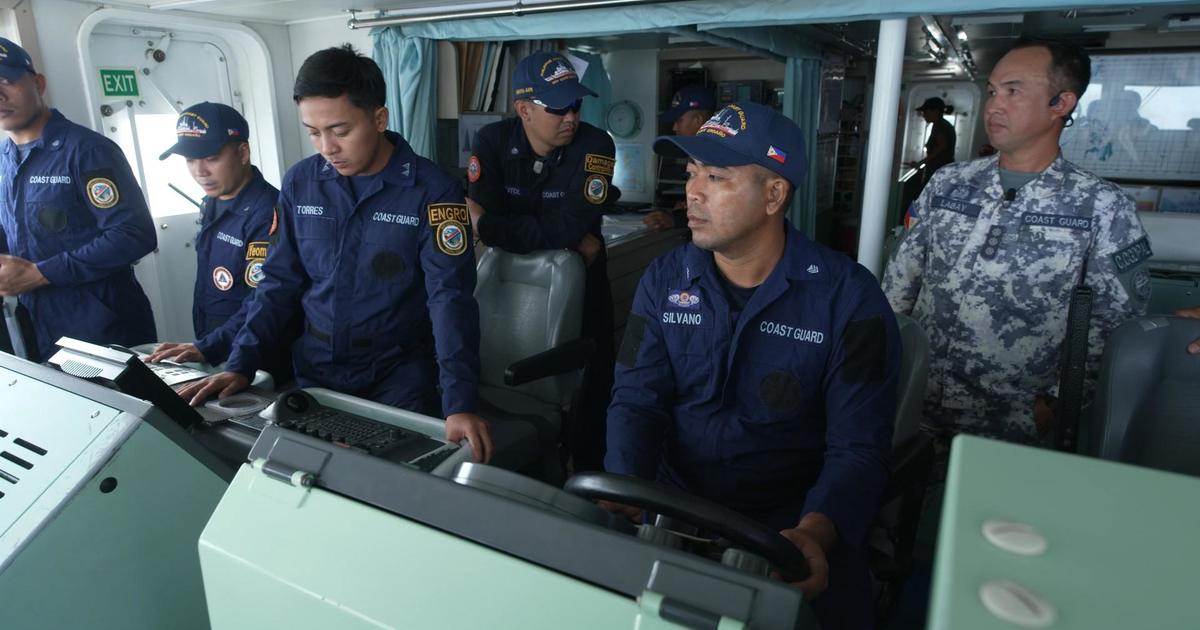An escalating series of clashes in the South China Sea between the Philippines and China could draw the U.S., which has a mutual defense treaty with the Philippines, into the conflict.
A 60 Minutes crew got a close look at the tense situation when traveling on a Philippine Coast Guard ship that was rammed by the Chinese Coast Guard.
China has repeatedly rammed Philippine ships and blasted them with water cannons over the last two years. There are ongoing conversations between Washington and Manila about which scenarios would trigger U.S. involvement, Philippine Secretary of National Defense Gilberto Teodoro said in an interview.
“I really don’t know the end state,” Teodoro said. “All I know is that we cannot let them get away with what they’re doing.”
China as “the proverbial schoolyard bully”
China claims sovereignty over almost all of the South China Sea, through which more than $3 trillion in goods flow annually. But in 2016, an international tribunal at the Hague ruled the Philippines has exclusive economic rights in a 200-mile zone that includes the area where the ship with the 60 Minutes team on board got rammed.
China does not recognize the international tribunal’s ruling.



That statement is so incredibly wrong in this particular context that it’s actually impressive.
Well, maybe not impressive, but it does show off your ability to speak authoritatively on a topic that you know absolutely nothing about, except of course for your firm conviction that capitalism is clearly the only thing motivating it all.
People understand the importance of the Malacca straight, Taiwan, and the various islands in that region. It’s the same reason Japan rapidly expanded into that region during WW2, bringing unimaginable suffering to the people in that region.
Maybe you aren’t making this point, and sorry if you aren’t, but that strategic interest does not give China the right to illegally sieze territory to suit itself. That is imperaliam. That is what Russia is doing in Ukraine and it is absolutely wrong.
Why does China not try to make allies in the region
The modern context of Japanese and Chinese expansionism in this particular area is similar in some ways, but very different in other ways.
Regardless, I agree that China doesn’t have the legal right to seize territory, but that doesn’t mean I shouldn’t understand their perspective.
It also doesn’t make the idiotic reductionist take that this is all “capitalism”, any less idiotic.
All that said, I also understand that great powers tend to only talk about international law when they are applying it to countries they view as beneath them, or inferior.
In this case, China is coming into its own as a regional hegemon, assuming their relatively new status as an outright dictatorship doesn’t fuck that up. To do that, it has to push out American naval power, there’s no alternative for them.
So, if Xi’s one man politburo figures out how to walk and chew gum, while also driving a successful regional expansion, I don’t think yours, or my, quibbles about international law will make much difference.
Luckily, whether he’s capable of juggling all that successfully, is still an open question with a lot of doubt.
China has been an outright dictatorship for a while now, it’s just the lifetime leader that was recent.
Words have meanings, and the word you’re looking for is authoritarian, but that doesn’t mean it was a dictatorship.
They were a one party system, that had regularly transitioned power at scheduled intervals for decades. Which means they were not a dictatorship, until Xi stopped those transitions of power.
You’re right, words do have meaning. Just because there is a transition from one dictator to another without bloodshed or death doesn’t mean it isn’t a dictatorship. Just because the dictator of the week is chosen by a committee doesn’t mean it isn’t a dictatorship. One-party systems are commonly accepted to be dictatorships because of the lack of ability by the people to choose their leader, rather it is chosen by the party (usually the party elites).
I know it’s cliche, but I really think you need to go look up the the definition of dictator.
Or, crack a political science 101 book and skip right to the section on political systems.
Or maybe your misunderstanding is just a lack of knowledge of how China’s government structure functioned post-Mao, pre-Xi.
Whatever the reason, I think you need to do a little bit of reading, but it’s not like you’re alone in this misconception so I don’t mean this as an insult.
Do you mean like the summary in Wikipedia? Or how about the Democracy-Dictatorship Index? It seems a lot of people in political circles have been calling China a civilian dictatorship for at least 36 years, just based on the cute little pictures.
Feel free to read a definition that’s more than one sentence long if you want an explanation for something as nuanced as political systems.
Your first link shows exactly why the CCP wasn’t a dictatorship in the era the preceded Xi, and your second link has nothing to do with that era at all.
I have an academic background in this field, so the idea that my understanding is based on reading a single sentence, or a few Wikipedia entries, is amusing.
Here’s a nice simple infographic article that would be a good starting point before jumping into any dry academic readings.